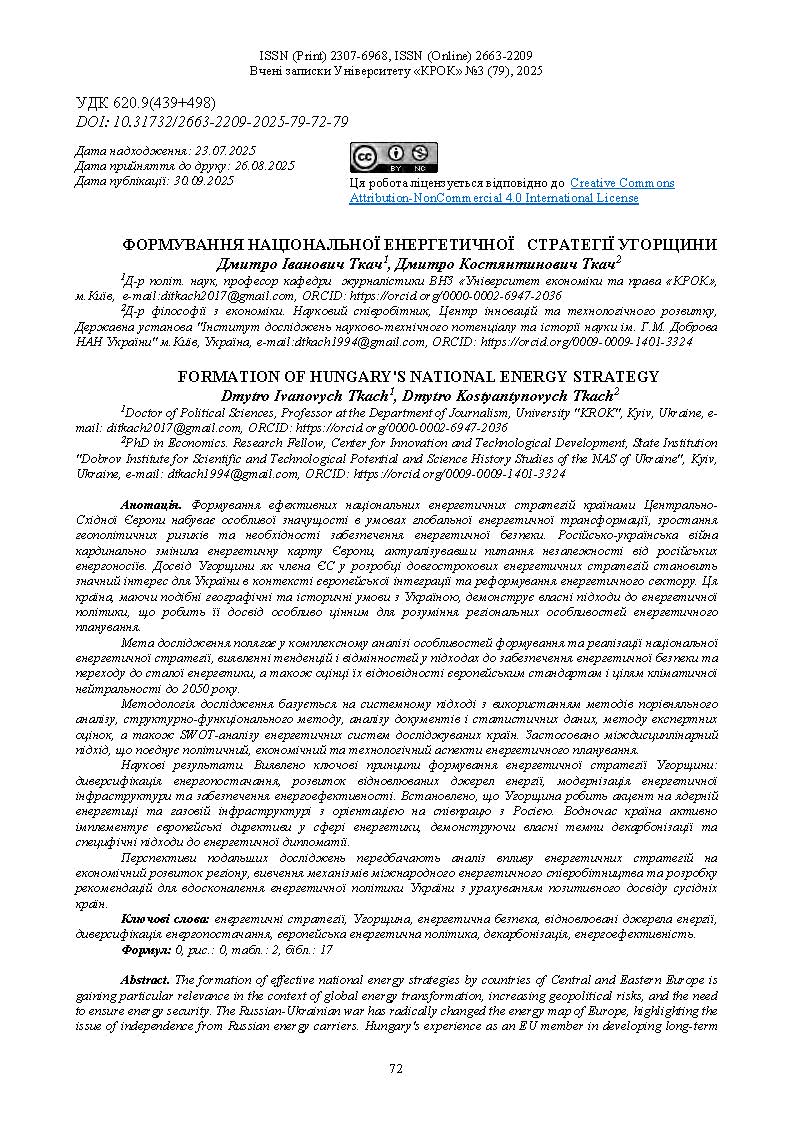FORMATION OF HUNGARY'S NATIONAL ENERGY STRATEGY
DOI:
https://doi.org/10.31732/2663-2209-2025-79-72-79Keywords:
energy strategies, Hungary, energy security, renewable energy sources, diversification of energy supply, European energy policy, energy efficiency, decarbonizationAbstract
The formation of effective national energy strategies by countries of Central and Eastern Europe is gaining particular relevance in the context of global energy transformation, increasing geopolitical risks, and the need to ensure energy security. The Russian-Ukrainian war has radically changed the energy map of Europe, highlighting the issue of independence from Russian energy carriers. Hungary's experience as an EU member in developing long-term energy strategies is of significant interest to Ukraine in the context of European integration and reforming the energy sector. This country, sharing similar geographical and historical conditions with Ukraine, demonstrates its own approaches to energy policy, making its experience particularly valuable for understanding regional peculiarities of energy planning.
The purpose of the study is to conduct a comprehensive analysis of the features of the formation and implementation of national energy strategy, identify trends and differences in approaches to ensuring energy security and the transition to sustainable energy, as well as to evaluate their compliance with European standards and goals for climate neutrality by 2050.
The research methodology is based on a systemic approach using methods of comparative analysis, structural-functional method, analysis of documents and statistical data, the method of expert assessments, as well as SWOT analysis of the energy systems of the studied countries. An interdisciplinary approach was applied, combining political, economic, and technological aspects of energy planning.
Scientific results. The key principles of the formation of Hungary's energy strategy were identified: diversification of energy supply, development of renewable energy sources, modernization of energy infrastructure, and ensuring energy efficiency. It was established that Hungary emphasizes nuclear energy and gas infrastructure with an orientation towards cooperation with Russia. At the same time, the country actively implements European directives in the field of energy, demonstrating its own pace of decarbonization and approaches to energy diplomacy.
Prospects for further research include analyzing the impact of energy strategies on the economic development of the region, studying mechanisms of international energy cooperation, and developing recommendations for improving Ukraine's energy policy, taking into account the positive experience of neighboring countries.
Downloads
References
Szabó, S., Bódis, K., Huld, T., & Moner-Girona, M. (2012). Climate and Energy Policy in Hungary. Energies, 5(2), 494-517 р. https://doi.org/10.3390/en5020494
Norbert Bozsik, András Szeberényi, Nándor Bozsik. Examination of the Hungarian Electricity Industry Structure with Special Regard to Renewables. Energies, 2023, 16 №, 3826.
Edina Vadovics. The Energy Challenge in Hungary: A Need for More Complex Approaches. Energy Demand Challenges in Europe. Palgrave Pivot, 2019, р. 113–129.
András Herczeg та Gyula Vastag. New Directions in the Hungarian Energy Market: Transformation of the National Public Utility. Pro Publico Bono – Magyar Közigazgatás, 2019 (2), р. 110–121.
Sylvia Beyer, Gergely Molnar. Accelerating energy diversification in Central and Eastern Europe. https://www.iea.org/commentaries/accelerating-energy-diversification-in-central-and-eastern-europe
Burciu, A., Bostan, I., Kicsi, R., Buta, S., Zoltan, R., & Condratov, I. Towards a sustainable approach of energy policy in the EU: empirical evidence for the Visegrad Group. Frontiers in Energy Research, 2025, 13, Article 1515788. https://doi.org/10.3389/fenrg.2025.15157881
Communities for RES - Energy Communities in Central Eastern Europe. https://caneurope.org/cee-energy-communities/
Janos Szlavik, Mária Csete. Climate and Energy Policy in Hungary. https://www.researchgate.net/publication/272647507_Climate_and_Energy_Policy_in_Hungary.
Д. М. Паламарчук, Н. О. Паламарчук. АНАЛІЗ ЕНЕРГЕТИЧНОЇ ПОЛІТИКИ КРАЇН УЧАСНИЦЬ МІЖНАРОДНОГО ЕНЕРГЕТИЧНОГО АГЕНТСТВА. chrome-extension://efaidnbmnnnibpcajpcglclefindmkaj/http://www.investplan.com.ua/pdf/16_2021/8.pdf
Hungary 2022 – Energy Policy Review. Executive Summary. https://www.iea.org/reports/hungary-2022/executive-summary
Центр політичних досліджень. (2025). Зміст російсько-угорських відносин в контексті ситуації в Україні [Електронний ресурс]. https://cpd.gov.ua/main/zmist-rosijsko-ugorskyh-vidnosyn/
Global Energy Prize. (2024). Hungary’s Paks II NPP receives approval for pouring of first concrete [Електронний ресурс]. URL: https://globalenergyprize.org/en/2024/12/06/hungarys-paks-ii-npp-receives-approval-for-pouring-of-first-concrete/
Hungary – Energy Market Overview: Nuclear and Renewables. https://www.trade.gov/market-intelligence/hungary-energy-market-overview-nuclear-and.
Wolf Theiss. (2023). Winds of change: Positive outlook for Hungary’s wind energy regulations. Wolf Theiss Insights. Отримано з https://www.wolftheiss.com/insights/positive-outlook-for-hungarys-wind-energy-regulations/
Enerdata. (2024, 09, 5). Hungary Energy Information. https://www.enerdata.net/estore/energy-market/hungary/
International Trade Administration. (2024). Hungary – Energy. https://www.trade.gov/country-commercial-guides/hungary-energy
Christin, S., & Stefanini, S. (2018, November 20). Hungary wants end to coal power by 2030. Climate Home News. з https://www.climatechangenews.com/2018/11/20/hungary-wants-end-coal-power-2030

Downloads
Published
How to Cite
Issue
Section
License

This work is licensed under a Creative Commons Attribution-NonCommercial 4.0 International License.

